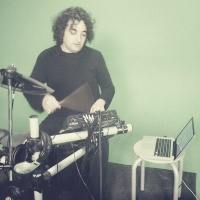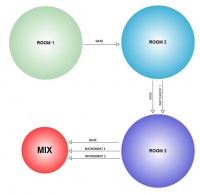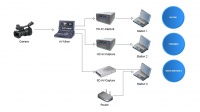Musiclab
From Vision - Multimedia Education
(→What is it?) |
(→How Can I Use It?) |
||
| Line 22: | Line 22: | ||
== How Can I Use It? == | == How Can I Use It? == | ||
| - | |||
| + | {| | ||
| + | |[[Image:Musiclab_diagram2.jpg|thumb|left|200px|Online sequential composing]] | ||
| + | |- | ||
| + | |'''Online Sequential Composing''': The idea is to connect several places together and try to play a musical piece in synchrony over the internet. The diagram shows how this works: Play a base from Room1, pass it onto Room2 where you add an instrument, pass the sum onto Room3 where you add a second instrument, and so on. The key here is that each room can only listen to what's been played in the previous rooms but not what will be played in the following rooms, this way all the signals will be sincronized and the final result will only be present in the last room. | ||
| + | |||
| + | |} | ||
| + | |||
note : python-twisted-bin et python-twisted-core forced version 10.0.0.2 | note : python-twisted-bin et python-twisted-core forced version 10.0.0.2 | ||
<br/><br/><br/> | <br/><br/><br/> | ||
| + | |||
== Who can use it? == | == Who can use it? == | ||
Revision as of 18:53, 28 June 2011
|
What is it?
Musiclab is a set of tools that can be used for pedagogical and experimentation purpouses, and it aims for a different approach on how to teach and enjoy music.
One part of the project is more traditionally pedagogical, as it tries to connect several centers thourgh a videoconference system with a main studio from where a musician performs a masterclass. In this case students from any of the connected centers will be able to ask questions and interact with the musician at the end of the class. Another modality of this more pedagogical part of the programme are the online auditions, which are short concerts from musicians who can interact with students as they play songs.
The other part of the Musiclab project is more experimental. We try to deal with issues that come up when trying to do music over the net. An example of this is latency, or delay, which we know is inherent in any connection. There are some phyisical aspects of playing online which will never disapear, like sound and light propagation times. Despite this, we believe it is possible to find new ways of playing music that can overcome this difficulties. We don't just experiment the technical issues, we believe music can be crucial in order to bring cultures together and a way for breaking cultural barriers that other artistic disciplines won't break. The universal language of music is key for understanding between cutlures; for example we have found patterns that connect such folkroic styles like the spanish flamenco, or the south korean pansori, and we have been able to jam together, each one in their own musical language, despite the obvious cultural differences.
How Can I Use It?
| Online Sequential Composing: The idea is to connect several places together and try to play a musical piece in synchrony over the internet. The diagram shows how this works: Play a base from Room1, pass it onto Room2 where you add an instrument, pass the sum onto Room3 where you add a second instrument, and so on. The key here is that each room can only listen to what's been played in the previous rooms but not what will be played in the following rooms, this way all the signals will be sincronized and the final result will only be present in the last room. |
note : python-twisted-bin et python-twisted-core forced version 10.0.0.2
Who can use it?
This toolkit is ready to be use by music teachers or youth workers that want to do some virtual presence activity with musicians.
What Do I Need?
The technical needs for a Musiclab session can vary from very heavy professional machinary, to conventional homestudio equipment.



